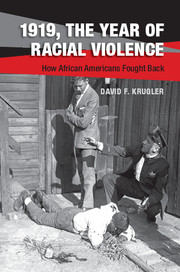Book contents
- Frontmatter
- Dedication
- Contents
- Acknowledgments
- Source Abbreviations and Usage Note
- Introduction
- 1 World War I and the New Negro Movement
- 2 “We Return Fighting”
- 3 Fighting a Mob in Uniform
- 4 Blood in the Streets
- 5 Armed Resistance to the Courthouse Mobs
- 6 Armed Resistance to Economic Exploitation in Arkansas, Indiana, and Louisiana
- 7 “It Is My Only Protection”
- 8 The Fight for Justice
- 9 The Fight for Justice
- 10 Fighting Judge Lynch
- Conclusion
- Bibliography
- Index
- References
10 - Fighting Judge Lynch
Published online by Cambridge University Press: 05 December 2014
- Frontmatter
- Dedication
- Contents
- Acknowledgments
- Source Abbreviations and Usage Note
- Introduction
- 1 World War I and the New Negro Movement
- 2 “We Return Fighting”
- 3 Fighting a Mob in Uniform
- 4 Blood in the Streets
- 5 Armed Resistance to the Courthouse Mobs
- 6 Armed Resistance to Economic Exploitation in Arkansas, Indiana, and Louisiana
- 7 “It Is My Only Protection”
- 8 The Fight for Justice
- 9 The Fight for Justice
- 10 Fighting Judge Lynch
- Conclusion
- Bibliography
- Index
- References
Summary
The killing of Will Brown on September 27, 1919, during Omaha’s riot marked the fifty-fourth lynching of the year. All told, seventy-seven African Americans lost their lives to lynching in 1919. The victims included another black man named Will Brown, burned alive alongside his friend Jack Gordon in Washington, Georgia, on October 5. Gordon had allegedly shot a white deputy; this Will Brown helped him escape from jail. The mob also killed a third man, Moses Freeman, who had allegedly lied about Gordon and Brown’s whereabouts.
By the standards of the era’s white supremacy, Freeman had committed a serious crime: he had obstructed a mob during its pursuit of rough justice. Many other lynching victims in 1919 lost their lives for similar transgressions against white supremacy. In April, a mob in Blakely, Georgia, beat black veteran Wilbur Little to death for ignoring warnings to stop wearing his military uniform. Another veteran and a female acquaintance lost their lives near Pickens, Mississippi, in May for allegedly writing an insulting note to a white woman. On August 1, two different Georgia mobs carried out lynchings: the first killed veteran Charles Kelly for failing to yield to a white driver; the second lynched Argie Robinson for refusing to address a white man as “Mister.” A mob in Tuscaloosa, Alabama, dismembered Cicero Cage for pulling a white woman off her horse. Yet another Georgia mob hanged an inebriated man for praising blacks’ armed resistance to mob attacks during Chicago’s riot.
- Type
- Chapter
- Information
- 1919, The Year of Racial ViolenceHow African Americans Fought Back, pp. 272 - 295Publisher: Cambridge University PressPrint publication year: 2014



